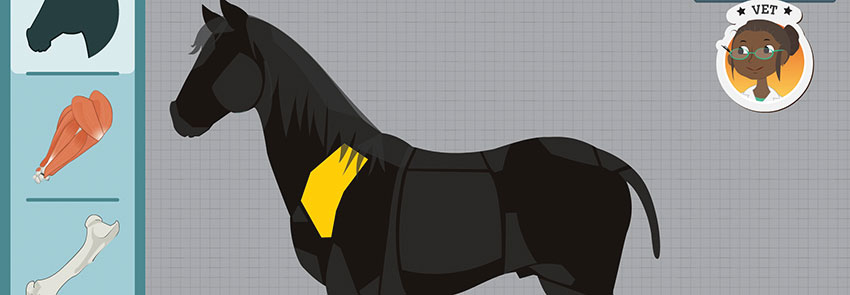
ANS 110: Introduction to Equine Science and “Trot to Trophy”
Both a prerequisite course for upper-level courses in the Department of Animal Science and a natural science course for the university’s GEP requirements, ANS 110: Introduction to Equine Science serves a unique group of students with highly varied levels of experience with horses.
To help meet this range of student needs and to gather more instructional tools for her class, Dr. Shannon Pratt-Phillips approached DELTA through an IDEA Grant (now called DELTA Grant) in 2009. In fall 2013, DELTA staff and student workers released “Trot to Trophy,” an educational game to teach basic concepts of horse care, such as nutrition, anatomy, breeds and horse careers.
Developing Trot to Trophy was a welcoming challenge for DELTA’s production team. While the small group of full-time staff led the project, they relied heavily on NC State student staff to research, storyboard, design, animate and program the game. The game’s artwork and animations were produced entirely by students. Through research, trial and error, and strong staff-faculty-student collaboration, the team saw the game take shape.
Instructional Challenges
The team faced two distinct challenges in developing a tool to effectively meet course learning objectives:
-
Help students with a range of backgrounds and equine experience learn key course concepts.
-
Create an educational game that is both pedagogically sound and fun to play, while meeting course learning objectives.
Highlights and Solutions
-
Content creation: Used the course textbook and previous Moodle course pages to develop sound content for the game.
-
Game design: Includes an attractive 2-D design and engaging storyline of 15 mini-games to help students interact visually and conceptually with the material.
-
Gamification of learning: Offers an alternative to traditional classroom lecture by engaging students in active learning, with game elements such as levels, rewards and personal avatars as motivation to become involved in the game (players can eventually earn “horse bucks” and purchase their own horse, which can then compete in various equine sporting events).
-
Ease of access: Available on desktop computers and mobile devices to allow students to access the game regularly and reinforce course material.
Evaluation Findings
- Evaluation findings suggest that the ANS 110 course helped increase students’ knowledge about equine science and familiarity with equine science topics.
- Students reported that 1) they used trot to trophy to study course material and prepare for exams, 2) the use of trot to trophy increased their familiarity with equine science topics (breeds of horses, uses of horses, horse health, and horse nutrition management) and improved their learning experience, and 3) recommended its use by future ANS 110 students. These findings were most pronounced for those with the least experience entering the course.
Related Links
Read Dr. Pratt-Phillips et al.’s article, “The Creation of an Equine Science Game,” in The Journal of Equine Veterinary Science (access requires an NC State unity ID or journal subscription).
For more information about DELTA services, please contact LearnTech.